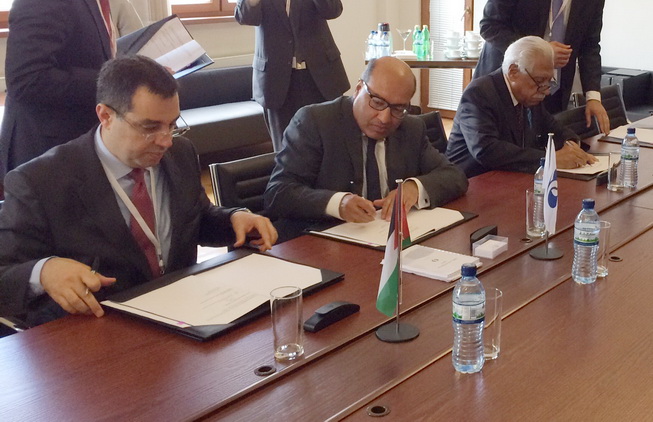
TaiwanICDF and EBRD Cooperate to Introduce Advanced Technologies, Generate Sustainable Energy in Jordan
The TaiwanICDF and the European Bank for Reconstruction and Development (EBRD) are cooperating on providing a loan to assist Jordan’s Greater Amman Municipality in constructing a biogas-based power generation system at the city’s Al Ghabawi landfill site. The signing ceremony for the associated loan agreement, held on May 15 at the EBRD’s annual meeting, was attended by Secretary General Weber V.B. Shih and the Taiwanese delegation to the meeting.
After completing the signing, Aqel Biltaji, the mayor of Greater Amman Municipality, presented the audience with an introduction to Jordan and Greater Amman’s investment environment alongside Jordan’s minister for planning and international cooperation, explaining that waste disposal, water supplies and transport were the major issues facing Greater Amman and keys to its municipal development. The mayor said that the timely investment of loan funds would allow Amman to “turn trash to cash,” which was of vital importance to the city, and thanked the TaiwanICDF and the EBRD on behalf of the city government.
Due to the double impact of high population growth and the ongoing movement and influx of refugees from places such as Syria and Iraq, the population of Greater Amman is forecast to more than double by 2025, which will bring with it problems for the city’s waste disposal.
At present, waste management practices in Jordan are not advanced. Much of the city’s garbage is incinerated or dumped directly, and dumping sites are usually unplanned, with no management given over to water seepage or biogas, causing numerous environmental and health problems. In response to the dilemmas that are feared will arise in connection to waste management and other municipal infrastructure, this project will introduce new waste management and waste-to-energy technologies, also serving as a demonstration to other countries in terms of landfill operations. The related power generation system will be connected to the national grid, reducing Jordan’s reliance on imported energy, as well as reducing emissions of CO2 by an estimated 150,000 tons per year.
In 2011, the TaiwanICDF committed US$80 million in establishing the Green Energy Special Fund (GESF) with the EBRD, together using financing to promote energy efficiency and associated municipal development and construction. With this case representing the first GESF project that the EBRD and the TaiwanICDF are carrying out in the four countries of the Southeast Mediterranean, representatives of the EBRD’s municipal and environmental infrastructure team say they are confident that the leading role taken by Greater Amman will ultimately drive other Jordanian municipalities and those in neighboring countries to follow suit.
The GESF encourages countries throughout Central and Eastern Europe, Central Asia and the Southeast Mediterranean in utilizing advanced green energy technologies and improving the energy efficiency of infrastructure. Other cases currently under way in Moldova, Romania and Kazakhstan include projects involving the replacement of urban street lights with LED lighting, and the construction of small-scale hydroelectric power generation systems.
- Update: 2018/03/01
- Hits:730

